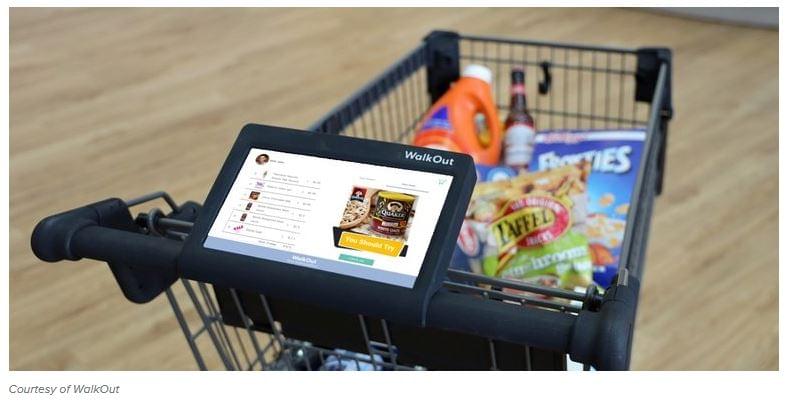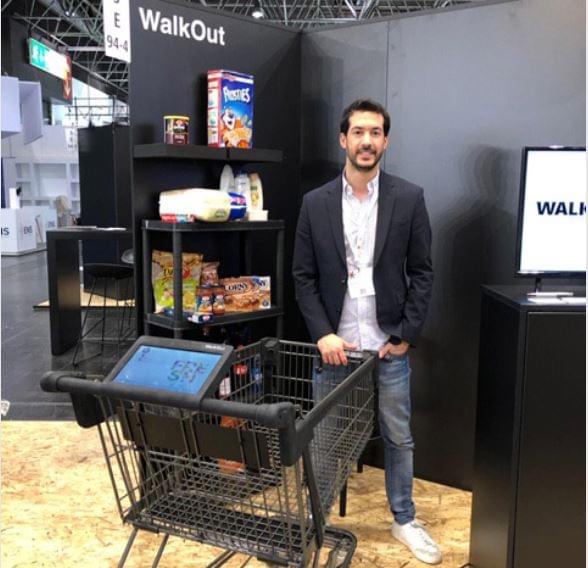New smart cart technology
Israeli startup WalkOut has made a plug-and-play option that costs less than other high-tech carts on the market. The smart cart tech firm retrofitts grocery carts as the technology’s growing popularity.

A new technology firm aims to give grocers a less expensive smart cart option that lets shoppers skip checkout lines while also offering in-store digital promotions.
Plug-and-play solution
Based in Tel Aviv, Israel, WalkOut has developed an autonomous end-to-end checkout platform that retrofits grocers’ existing carts to turn them into smart carts by using cameras, computer vision and machine learning to identify when items are added and removed.
Founded by three friends with a wide range of technology expertise, WalkOut taps into the growing trend across grocery retail for more self-service options with what co-founder and CEO Assaf Gedalia said is a cost-effective plug-and-play solution.
Cheaper than competition
As retailers like Amazon and Kroger test out smart carts in their stores, WalkOut is betting that a less bulky and expensive version will entice retailers into trying out the increasingly popular technology. Gedalia declined to note the unit price for a WalkOut solution. In a news release, the startup noted that its solution is considerably less expensive than the $5,000 to $10,000 price range for fully outfitted smart carts.
WalkOut’s kit includes cameras, a base with a touchscreen, a processing unit and battery. Grocers can retrofit their carts themselves, but Gedalia recommends grocers use the full service that WalkOut offers, including installation and ongoing maintenance and support.
“WalkOut delivers very high accuracy — we’re above 99%” because cameras are positioned at different angles to identify products, Gedalia said, noting that the solution also works on two-tiered carts.

Operation background
“You see everything you bought by weight, by price … If you identify a mistake, you can delete it. You can call for help,” Gedalia said. “Everything can be sorted out on screen. You can add products. You can change quantities.”
For weighted items like produce and bulk products, shoppers have to use separate scales, which are often placed in their corresponding departments, that print off barcodes for the unit to scan. If a shopper tries to place an item in their cart that hasn’t been weighed, a message will pop up on the screen saying it needs the barcode scanned and won’t let customers leave the store until it is, Gedalia said.
When ready for checkout, shoppers have a few options. The system can transfer either by wireless communication or a QR code the list of scanned items to self-checkout or traditional checkout stations. Shoppers who want to skip the checkout lane can pay using their e-wallet or with their credit card on the retailer’s app by scanning the QR code. The unit doesn’t allow shoppers to swipe or insert their credit cards.
The technology “walks” with shoppers through the store and transmits data to the retailer about what’s inside the carts. With this real-time visibility, WalkOut unlocks new opportunities for real-time product recommendations, promotions and research.
Future plans
WalkOut plan to eventually retrofit handheld shopping baskets with its technology and also expand beyond the grocery industry to other types of retailers like drugstores and home improvement stores. WalkOut is piloting with eight major retailers across the U.S., Europe and Israel.
Nielsen and Israeli food distributor Leiman Schlussel also invested in the company.
Related news
How Coca-Cola plans to build more billion-dollar brands
🎧 Hallgasd a cikket: Lejátszás Szünet Folytatás Leállítás Nyelv: Auto…
Read more >Hungarian students once again finished in the top spot in the Taiwanese innovation competition
🎧 Hallgasd a cikket: Lejátszás Szünet Folytatás Leállítás Nyelv: Auto…
Read more >Blue Planet: A Hungarian company saves energy with a solution known from space exploration
🎧 Hallgasd a cikket: Lejátszás Szünet Folytatás Leállítás Nyelv: Auto…
Read more >Related news
Brits Embrace At‑Home Celebrations While Germans Cut Back on Valentine’s Day Spending
🎧 Hallgasd a cikket: Lejátszás Szünet Folytatás Leállítás Nyelv: Auto…
Read more >








